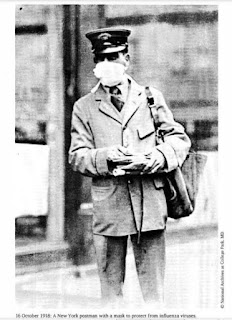On January 30, India reported its first case in Kerala's Thrissur. Most of us thought that like Sars or Nipah or Ebola or Mers, this too will be contained soon although the nCoV's first strain was found in China's Wuhan at least 30 days before that. On January 29, World Health Organization (WHO) issued its first advice on the use of masks. This led to a flurry of thoughts among people while several were of the opinion that masks are not necessary to curb the virus, especially the advice noted that 'medical mask is not required, as no evidence is available on its usefulness to protect non-sick persons'. To me, that was the first off-on dilemma --- whether you need a mask or not!
About a fortnight back then, in mid-January, when i went to pick up some masks with my friend to a neighbourhood medicine shop, the imported N95 masks were found at Rs 100 apiece. Shortly, the imported varieties were off the shelves, and replaced by cheaper local varieties at Rs 50-60 per piece. My friend, who began using it during his commute in January, was ridiculed by his colleagues till each of them got one from the office in third week of March for mandatory use. Even on March 9 when i met two doctor friends, neither of them was wearing a mask. Incidentally, that was the day Pune recorded its first covid case.
Masks are probably the first weapon --- second being washing hands with soap or rubbing the palms with alcohol-based sanitisers --- to win the battle against covid. Incidentally, masks were made mandatory during Spanish flu of 1918 as is evident in this photo of a New York postman.
Most of the on and off orders began once the country had gone to strict lockdown mode from March 25. It may be funny but worth recalling that several such orders had, or still have, been operating on different layers. Something what the Union government allows to operate is also okayed by the state government but the local civic body does not approve it, which however gets the police station-level nod but does not reach your doorstep, as the housing complex bosses have the last word.
From housemaids to milk packets, from newspapers to liquor shops, from cab aggregators to food delivery partners --- separate and ever-changing rules for each sector baffled me, like thousands others. Not only the tangible ones, think about the apps. Of course, it would have been prudent if all establishments, be it government or private, adhere to only one app, maybe the centralised contact tracing app Aarogya Setu, downloaded by 13.86 crore of Indians (about 10% of total population) as on July 6. But that's not the case. From government departments to private offices to even local departmental stores began developing apps during the lockdown. And, when Unlock 1.0 was rolled out last month (ironically, amid lockdown!), such apps made way to homescreen of our smartphones. If you don't have a smartphone today (only 25.3% Indians had smartphones in September 2019), then you are doomed, and may face difficulty to access basic facilities, like taking a train.
Adding to the confusion are numerous orders-revised orders-clarifications by the government about whether this kind of shop should remain open or even asymptomatic patients should be at home or not. Like many an archaic British-era law, another such rule, Epidemic Diseases Act of 1897 (yes, not 1997, which i thought a typo coming across for the first came in a government order in March), has been imposed on us to tackle this crisis. It reminded me of West Bengal government's land acquisition in Singur in 2008 under an act that itself was 115 years old that time!
Under this 1897 act, sale of tobacco is apparently banned during epidemic, but what about the liquor sale? It got a nod as it would ramp up revenue, as if no tax is levied on cigarettes. Fuel refill stations in Pune were open to only essential service vehicles between 10 am and 2 pm, in clear indication that nCoV remains inactive during that time. But such vehicles could not refill tyres as all garages were closed for two months. Look for a garage that was operating surreptitiously to fix a tyre if that goes flat --- probably local admin wanted that.
So were the vegetables and grocery shops opened between 10 am and 12 noon, leading to crowded markets but babus were hardly convinced. They thought that it's perfectly alright, and when the government announced one day that shops selling essential items can be opened for 12 hours till 7 pm, the next day local police reimposed the old order! There is hardly any respite from such confusing orders and executions.
I came across letters written to the editor of The Times of India while researching how people reacted to the plague epidemic that struck Bombay in 1896. Not to my surprise, people almost 125 years ago also asked for proper isolation against the similar backdrop of fears and stigma of a contagious disease like today, fuelled by perplexing civic orders!




No comments:
Post a Comment